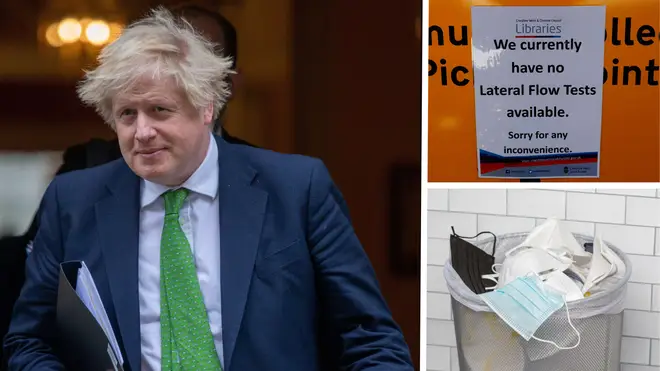
Nick Ferrari 7am - 10am
24 February 2022, 00:01 | Updated: 7 June 2023, 08:56

All coronavirus laws in England including the legal requirement for people who test positive to isolate have ended, in what has been hailed Freedom Day.
From today, those who receive a positive Covid-19 test will still be advised to stay at home for at least five days, but will not be obliged to under law.
The Prime Minister claims his 'living with Covid plan', which also includes plans to scrap free universal testing in April, will bring the country "towards a return to normality".
Boris Johnson said the move would "finally give people back their freedom" after "one of the most difficult periods in our country's history".
Routine contact tracing will also end today, as will the £500 self-isolation payments and the legal obligation for individuals to tell their employers about their requirement to isolate.
Changes to statutory sick pay and employment support allowance designed to help people through the coronavirus pandemic will end next month on March 24.
Explained: Living with Covid plan: How Britain is set to change in the days ahead
Read more: Ukraine hit by cyber attacks as fears grow of major Russian offensive 'within 48 hours'

Chris Whitty says those who have Covid should still self-isolate
Whilst free universal testing will be massively scaled back from April 1 and will instead be focused on the most vulnerable, with the UK Health Security Agency set to determine the details, while asymptomatic testing will continue for social care staff.
Mr Johnson, making the announcement in the House of Commons, said: "Covid will not suddenly disappear so those who would wait for a total end to this war before lifting the remaining regulations would be restricting the liberties of the British people for a long time to come.
"This government does not believe that is right or necessary. Restrictions pose a heavy toll on our economy, our society, our mental wellbeing and on the life chances of our children, and we do not need to pay that cost any longer."
But on Monday, England's chief medical officer Professor Sir Chris Whitty said people should still isolate if they have Covid-19 despite the legal requirement ending.
He said it is "standard public health advice" as he warned that while rates are coming down it is "still a very common infection".
Read more: PM announces end to self-isolation rules and free Covid tests after last ditch Cabinet row
Read more: Spring Covid booster jab approved for elderly and vulnerable people

Health Sec hails "historic day" as govt announces end of restrictions
Mr Johnson acknowledged there is likely to be another variant that will "cause us trouble", saying he did not want people to think "there's some division between the gung ho politicians and the cautious, anxious scientists".
He said: "The most important thing is that - and I hope this is the big take-out from this - the sun is shining but we're keeping our umbrella."
The scrapping of rules was met with mixed reaction as the British Medical Association warned that the strategy "fails to protect those at highest risk of harm from Covid-19, and neglects some of the most vulnerable people in society".
Groups representing vulnerable individuals also sounded the alarm over the end to isolation laws, with the Scope disability equality charity saying it would usher in a life "living with fear".
Blood Cancer UK warned that the plan "will cause huge anxiety among immunocompromised people and leave many of them feeling abandoned", while the MS Society said the scrapping of free universal testing is "not only reckless but dangerous".
Read more: Matt Hancock: We're the first major country in the world to be past the pandemic
Read more: Heavy snow and wind to batter UK as weather warnings issued days after storm chaos

'This is a half baked announcement from a govt paralysed by chaos'
But LBC's Nick Ferrari said Freedom Day is a moment of "national pride" as Matt Hancock announced England is "the first major country in the world to be past the pandemic".
Meanwhile, public transport users in London will no longer be required to wear face masks from Thursday.
Transport for London announced that face coverings will stop being a condition of carriage following the "shift in the Government's approach" towards living with coronavirus.
It added that "decreasing infection rates in London" were also a factor in its decision.
Downing Street has confirmed the vaccine programme remains open to those who have not yet had a jab.
With people aged 75 and over, the immunosuppressed and those living in care homes set to be offered another Covid-19 booster vaccine this spring.